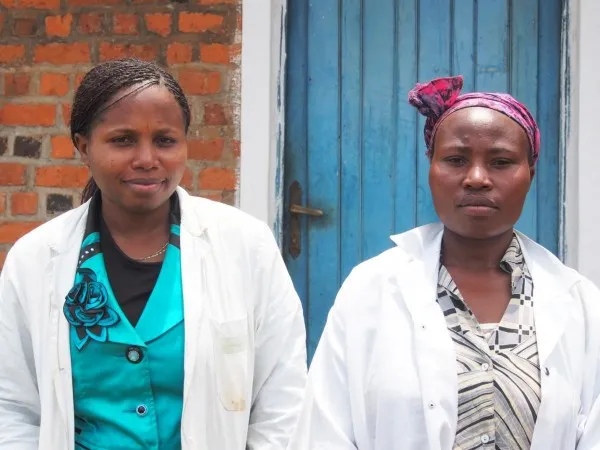Women Helping Women to Overcome Trauma from Violence in Eastern Congo


Honorine and Marie Claire wake up at 5 am to walk two and three hours respectively to arrive to work on time at the Bugobe health center. The two women come from different backgrounds and have different specialties and responsibilities. When not providing CPT, Honorine is the head nurse in charge of the maternity unit, where she has worked for three years, and Marie Claire has been working as a nutritionist for four years. Though their day-to-day jobs differ, Marie Claire and Honorine share a passion for CPT. They believe it is a crucial way for survivors of gender based violence (GBV) to face and overcome the trauma that they have experienced. Since receiving treatment, many of the survivors with whom they work, who thought they were healed realized that they had residual feelings locked away, which CPT has helped them to uncover and address.
Through 12 sessions (1 individual and 11 group) the survivors were able to identify these feelings and understand that their symptoms are shared by others who had also experienced a traumatic event.
Honorine and Marie Claire also insist that the therapy has helped them in different aspects of their own lives. In their professional life, they are able to take what they have learned in the CPT training and use it in other areas of their work. In their personal lives, they are now able to identify and address their own repressed feelings, which they have managed to work through themselves.
For Honorine and Marie Claire, providing CPT has not been without a few challenges. The travel to work is long and many times they now have to leave their homes at five in the morning or earlier so that survivors can receive services before they start their daily tasks. The two of them are the only two CPT providers at the Bugobe Health Center, so other nurses and staff at the health center have to cover them while they provide therapy in an already understaffed environment. In addition, the preparation for the therapy requires a significant amount of additional time so they have to rearrange their schedules so that they can prepare together.
Despite these challenges, Marie Claire and Honorine are hopeful for the future of cognitive processing therapy and thankful for the support of the IRC’s partners. They believe that CPT empowers women to address their own psychosocial needs and that it can aid not just survivors of sexual violence but all Congolese to address trauma they may have experienced in their lives.
With support from the Humanitarian Innovation Fund, the International Rescue Committee is piloting Cognitive Processing Therapy (CPT) in eastern DRC, a targeted mental health therapy that gives survivors of sexual violence a new way to manage distressing thoughts and overcome trauma.
Stay updated
Sign up for our newsletter to receive regular updates on resources, news, and insights like this. Don’t miss out on important information that can help you stay informed and engaged.
Related articles


.png)
Explore Elrha
Learn more about our mission, the organisations we support, and the resources we provide to drive research and innovation in humanitarian response.